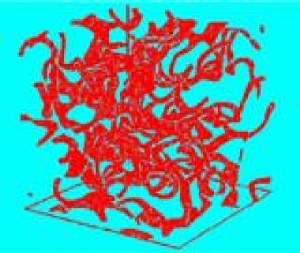Jul 20 2009
Scientists in Brazil report the controllable formation of quantum turbulence in an ultra-cold atom gas. The results, which appear in the July 20 issue of Physical Review Letters and are highlighted in the APS journal Physics may make it easier to characterize quantum turbulence - and potentially even classical turbulence - because it is possible to tune many characteristics of the cold-atom gas.
 Scientists have imaged the vortices that form in the turbulent state of an ultra-cold atom gas. Credit: Image copyright American Physical Society [Illustration: Adapted from E. A. L. Henn et al. Phys. Rev. Lett. (to be published)]
Scientists have imaged the vortices that form in the turbulent state of an ultra-cold atom gas. Credit: Image copyright American Physical Society [Illustration: Adapted from E. A. L. Henn et al. Phys. Rev. Lett. (to be published)]
Turbulence is considered a nuisance because it slows down boats and jars airplanes. But for hundreds of years, physicists have been fascinated with the notoriously difficult problem of how to describe this phenomenon, which involves the formation and disappearance of vortices – swirling regions in a gas or liquid– over many different length and time scales.
Turbulence can also occur in quantum fluids, such as ultra-cold atom gases and superfluid helium. In a quantum fluid, the motion of the vortices is quantized; and, because quantum fluids have zero viscosity, the vortices cannot easily disappear.
These properties make quantum turbulence more stable and easier to understand than classical turbulence. Now, Emanuel Henn and colleagues at the University of Sao Paulo in Brazil and the University of Florence in Italy have created quantum turbulence in a gas of ultra-cold rubidium atoms by shaking it up with a magnetic field. In this way, they are able to control the formation of vortices and generate many different kinds of turbulence to explore a number of questions relevant to both its quantum and classical forms.